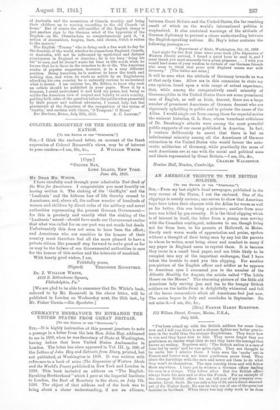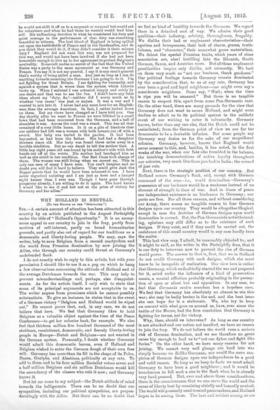AN AMERICAN TRIBUTE TO THE BRITISH SOLDIER.
[To ma EDITOR or nix "SPECTATOR."] Sin,—From my last night's local newspaper, published in the very corner of the States, I out the enclosed. One of the clippings is merely curious ; one serves to show that American boys have taken their chances with the Allies for worse as well as for better, this one being a prisoner; another from near here was killed by gas recently. It is the third clipping which is of interest in itself, the letter from a young man serving with the Canadian contingent, unknown to me, though living not far from here, to his parents at Hallowell, in Maine. Surely such warm words of appreciation and praise, spoken without a thought of their being seen by any but the parents to whom he writes, must bring cheer and comfort to many if any paper in England cares to reprint them. It is because they occur in a small local paper, and are little likely to be recopied into any of the important exchanges, that I have taken the trouble to send you this clipping. For another pen-picture of the English officer and soldier as he appears to American eyes I commend you to the number of the Atlantic Monthly for August, the article called "The Little House on the Marne." The charming picture of the little old American lady serving jam and tea to the hungry British soldiers on the battle-front is delightfully whimsical and full of the bonne camaraderie which all Americans feel just now. The series began in July and concludes in September. Do not miss it.—I am, Sir, &c., (Mrs.) FANNIE HARDY ECRSTORM.
178 Wilson Street, Brewer, Maine, U.S.A., July 28th.
" I've been mixed up with the British soldiers for some time now and I tell you there is not a cleaner fighter nor better gentle- man in the world than the average Englishman. They know how to win and they know how to lose. They never forget they are gentlemen no matter what they do and they have the courage that knows no ending. Napoleon said ' The British nation is a race of lions led by asses' and he was quite right. They are thought to bo snobs but I admire them. I have seen the 'snobs out in France and braver men nor truer gentlemen never lived. They share the hardships with the men and never ask them to do what they won't do themselves. The men worship them and will follow them anywhere. • I have yet to witness a German officer leading his mon in a charge. They follow after. But the British officer always leads his men and so does the French. For an example of the average British officer let me tell you of my company com- mander, Lieut. Scott. He was only a boy of 20, and a direct descend- ant of Sir Walter Scott. He was an only son of one of the proudest families in Scotland. When there was any risky work to be dons he would not shift it off on to a sergeant or corporal but would ask for volunteers and when ho had those he wanted would lead him- self. His unflinching devotion to what he considered his duty and quiet courage in the performance of that duty was something beautiful to witness. The best blood of England is being spilled out upon the battlefields of France and in the Dardanelles, and do you think they would do it, if they didn't consider it their solemn duty P England did not want this war, was not prepared for this war, and would not have been involved if she had not been honorable enough to live up to her agreement to protect Belgium's neutrality. Roosevelt makes no secret of the fact that the United States was a party to the same agreement as was Germany and France. You say it is not my quarrel. I say it is any man's quarrel that's worthy of being called a man. And just as long as I can do anything towards smashing the Germans I am going to do it. I'm not fighting for Groat Britain. I am fighting for humanity, and against a system that is worse than the system which Lincoln broke up. When I enlisted I was actuated simply and solely by one desire and that was to see the fun. I didn't have any false ideas about my duty, &c.'—neither did I worry much as to whether • our cause' was just or unjust. It was a war and I wanted to mix into it. I never had any more love for an English- man than the average American. In fact, I rather looked down on them. But my views have changed as I have told you. One day shortly after we went to France we were billeted in a small town that had been recovered from the Germane, and a hell of shambles it was. Across the road was a shack. This was all that remained of a cosy little home. In it on a pile of blankets that our soldiers had left was a woman with both breasts cut off with a sword. Her baby was buried in the garden. It had been bayoneted, as had been the father. She had bad a daughter thirteen years old. Her body was found three miles away in a terrible condition. But no one dared to tell the mother that. A little boy eight years old was found by his mother's side with both hands cut off at the wrists. His mother had bandaged him as well as she could in her condition. Our Red Cross took charge of them. The woman was still living when we moved on. This is only one case of many I have seen. You can't imagine and no doubt you will find it hard to believe. They could give Jack the Ripper points that he would have been ashamed to U80. I have never regretted enlisting and I am just as keen and a hanged sight keener than I ever was. Though I have gone through purgatory already, I am willing to do it again. The Lord knows I would like to see it end but not at the price of victory for Germany and her allies."



































 Previous page
Previous page